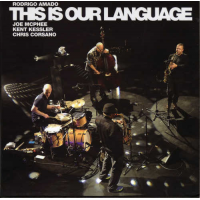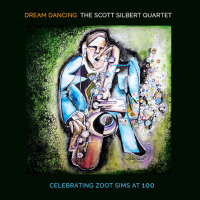Home » Jazz Articles » Rodrigo Amado
Jazz Articles about Rodrigo Amado
Rodrigo Amado: A History Of Nothing

by John Sharpe
In A History Of Nothing, Portuguese saxophonist Rodrigo Amado helms a stunning lesson in group interchange and shifting dynamics on five seat-of-the-pants excursions. Captured in a studio in the midst of a European tour, the album reunites the reedman with the starry crew responsible for This Is Our Language (NotTwo, 2015), namely veteran multi-instrumentalist Joe McPhee, bassist Kent Kessler and drummer Chris Corsano. In doing so it presents four musicians at the top of their game.If the last ...
Continue ReadingRodrigo Amado: A History Of Nothing

by Mark Corroto
Biologists believe the principle undertaking of an organism is to pass along its genes to the next generation. That same theory is also applied in psychology. Evolutionary psychology tells us that human behavior has been tailored to pass on our DNA to the next generation, even applying this theory to economics, politics, law, and literature. This disc by saxophonist Rodrigo Amado's quartet is evidence we can expand evolutionary theory to music, specifically jazz improvisation. Amado, a torchbearer of ...
Continue ReadingRodrigo Amado: The Attic

by John Sharpe
The Attic unites three Portuguese musicians who are making a name for themselves beyond their native land. Now based in Rotterdam, bassist Gonçalo Almeida works with a range of European artists, but may be best known as leader of the Lama Trio, with trumpeter Susana Santos Silva. Saxophonist Rodrigo Amado probably enjoys the highest profile, befitting his activity with his own Motion Trio, which has featured as guests trumpeter Peter Evans and trombonist Jeb Bishop, as well as with his ...
Continue ReadingRodrigo Amado, Joe McPhee, Kent Kessler, Chris Corsano, live at Bimhuis Amsterdam

by Henning Bolte
Rodrigo Amado, Joe McPhee, Kent Kessler, Chris Corsano Bimhuis Amsterdam March 8, 2017 As part of a European tour through nine countries, the Portuguese-North American configuration of Lisbon tenor saxophonist Rodrigo Amado, multi-instrumentalist Joe McPhee (saxophones, trumpet, didgeridoo), bassist Kent Kessler from Chicago, and young drummer Chris Corsano also from New York, finally made its first appearance at Amsterdam Bimhuis. Many will associate these musicians with something like 'raucous free jazz.' The ...
Continue ReadingRodrigo Amado's Motion Trio: Desire & Freedom

by Glenn Astarita
Portuguese saxophonist Rodrigo Amado's mark of distinction is generally centered on his assertive approaches to experimentation within numerous offshoots and slants of the jazz vernacular. He's become a major player on the Euro progressive jazz scene amid sessions with American free-thinking acolytes, trombonist Jeb Bishop, bassist John Hebert, trumpeter Dennis Gonzalez and many others of note. Here, Amado performs with his fellow countrymen for a blossoming asymmetrical affair, firmly rooted in a spirited free-form jaunt, teeming with buoyant flows and ...
Continue ReadingRodrigo Amado's Motion Trio: Desire & Freedom

by John Sharpe
Desire And Liberation constitutes only the second album in Portuguese saxophonist Rodrigo Amado's Motion Trio discography not to feature a guest since their eponymous debut (European Echoes, 2009). While some may decry the lack of a foil for the leader's muscular tenor saxophone (and past collaborators trumpeter Peter Evans and trombonist Jeb Bishop supplied that and more), it does present an opportunity to appreciate the finely wrought interchange of the core trio completed by drummer Gabriel Ferrandini and cellist Miguel ...
Continue ReadingRodrigo Amado: This Is Our Language

by Glenn Astarita
Experimental jazz, largely framed on wide-ranging improvisational tactics, inhabits a tightknit if not cloistered community, partially by default due to its avant-garde underpinnings. With the album moniker This Is Our Language, eminent Portuguese saxophonist Rodrigo Amado imparts a bond or connection to free-jazz pioneer Ornette Coleman's fifth album, This Is Our Music (Atlantic, 1960). Legendary saxophonist, trumpeter Joe McPhee consummates the frontline, as the overall muse encapsulates a hybrid exposition of temperate and supersonic explorations amid nods to ...
Continue Reading
















